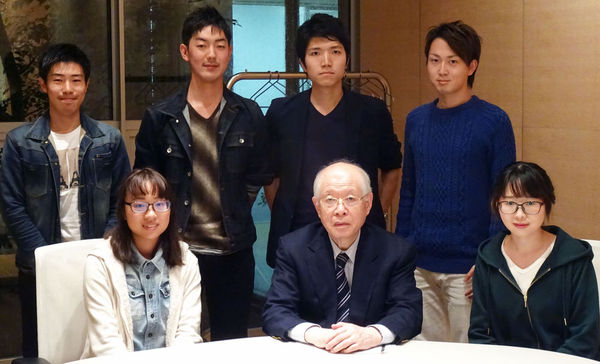Since January 2013, University Prof. Ryoji Noyori, a Nobel Laureate in Chemistry (2001), has contributed numerous articles to "Kamitsubute" in Chunichi Shimbun. Based on these articles, he holds regular academic discussions with students at Nagoya University. At the 22nd Noyori Academy Salon, held on October 28, 2016, Prof. Noyori and six students from different academic fields openly discussed the difference between "Only-one and Number-one." Prof. Noyori insisted that scientists should pursue originality born out of their own sensibilities.

Satoru Yamashita, a second-year student at the Graduate School of Economics, Nagoya University
It is not easy to aim for “only-one.” I think “only-one” can be a result produced on the process of aiming for “number-one.”
Prof. Noyori
“Number-one” is for a winner in a competition which follows rules. For example, teachers at school provide questions, for which answers are prepared beforehand; however, academic research at universities requires an ability to first discover the questions and then find answers for these. This leads to the birth of originality or creativity. The phrase “Curiosity of Heaven” testifies that everyone has curiosity.
Junpei Mizutani, a senior at the School of Letters, Nagoya University
How should we set up the criteria to aim for “only-one?”
Prof. Noyori
Creativity means to be rich in originality. For example, four panels of judges scored two articles as follows: 4-3-3-3 and 5-1-1-1, out of a 5. Which score do you think is better in terms of originality? As per my view, the score 5-1-1-1 is better in terms of the uniqueness as it gives ample chances for the experts to hold open-discussions based on the article. By the way, it is the purpose of “open-science” at universities.
Unique research can attract people, thereby first expanding in terms of scope and then competing to stay unique at all times. Through this process, many challenging questions will be raised and expanded both in business and in society. The Nobel Prize is awarded to the person who creates something original from such an expansion of thought.
Katsushi Kobayashi, a second-year student at the Graduate School of Bioagricultural Sciences, Nagoya University
Japanese scientists have been awarded for the Nobel Prize for three consecutive years. What should young people take away from this fact?
Prof. Noyori
By finding what the common traits between all Nobel laureates are, I had done what I wanted to do, believing in my sensibility and ability. When I studied abroad at Harvard University, I met many brilliant researchers; however, everyone was not successful as a researcher. Fortunately, as Japanese, I kept my originality different from others. That is, for young people, what is important is your sense of values which are influenced by the environment where you were born and raised. This will allow you to largely contribute to open up a new field.
Shi Jiayuan, a research student at the Graduate School of International Development, Nagoya University
I found through our university days that it is important to produce original and novel research achievements for innovation. As technology contributes to become more innovative these days, I am interested in protecting the environment.
Prof. Noyori
In order to develop science further, we must realize that one cannot do it alone. Collaboration between diverse people is paramount to achieve this goal. As the problems related to the environment are ones that cross national borders, we must have discussions with people whose sense of values are different from ours.
Koki Ozato, a senior at the Faculty of Pharmacy, Meijo University
In fact, when I discuss with people from different backgrounds or fields, I start questioning what I have not doubted so far.
Prof. Noyori
Knowing is important. For instance, the United Nations (UN) called countries to adopt a set of goals to end poverty, protect the planet, and ensure prosperity for all, as part of a new development agenda. The UN insists that one country cannot solve the world’s problems and that everyone needs to assume their fair share for common goals to be reached. I believe that survival of the human race is significant; therefore, we have to be aware of the future for the next generations, rethinking conventional wisdom around us.
Hu Li, a second-year student at the Graduate School of Bioagricultural Sciences, Nagoya University
Our research should not be conducted solely out of interest, but we should also take responsibility for what we do.
Prof. Noyori
Anytime you challenge your research, it should be done in the name of future generations. By making yourself aware of the future, I believe that we discover unique questions born from our original sensibility, which therefore might result in meaningful innovation for the future.
(by Ayako Umemura/NU Research)